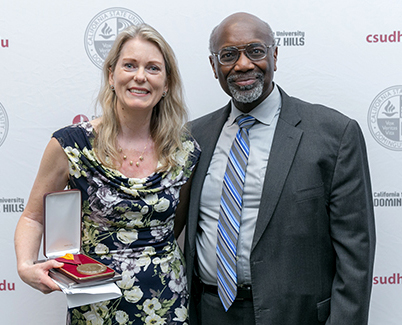
A Q&A with Helen Oesterheld. associated professor of English, 2017 Faculty Award winner for “Excellence in Service.”
The Excellence in Service Award recognizes the role faculty play in the governance and development of California State University, Dominguez Hills, but also the contributions they make to their fields of expertise. In her 13 years at CSU Dominguez Hills Helen Oesterheld has been active on both fronts.
In addition to her teaching load within the Department of English and the External Humanities (HUX) online master’s degree program, Oesterheld has served the university in a number of capacities, from department chair to Academic Senate member; faculty adviser to the English Graduate Association and University Advisement Center to thesis adviser and mentor and judge for Student Research Day; and several initiatives and committees to assess and improve student writing and the integration of writing across the curriculum. She also serves on the WSCUC Accreditation Steering Committee and is a team leader for the First Year Seminar program.
Oesterheld specializes in Restoration and 18th-century British literature, primarily focusing her research on “literature of sensibility,” domestic and utopian fiction, the Gothic, and all-female communities. She has also contributed scholarship in the area of peer collaboration within the writing process. She has been recognized with a research fellowship at UCLA’s William Andrews Clark Memorial Library; the Sally Casanova Memorial Award; the Emeritus Faculty Association Legacy Fund; the Department of English Research Initiatives Fund; the Center for Teaching and Learning; and by the College of Arts and Humanities.
Oesterheld has published on the gothic fiction of Ann Radcliffe, and she is currently working on articles focused on Sarah Scott’s Millenium Hall (1762), a utopian novel, and the writings and legacy of Mary Astell, a 17th-Century scholar and early proponent of women’s academic education.
Q: How did you feel to learn you would be honored with a 2017 Faculty Award?
A: When I found out I was chosen to receive the Excellence in Service Award I was humbled and delighted. It is wonderful to be recognized by my colleagues, but at the same time it really brings home the fact that so many CSUDH faculty members work tirelessly and passionately to serve students.
Q: What fascinates you about Restoration and 18th-Century literature?
A: Restoration and 18th-century British literature is marked by deep contradictions that might ring familiar to a 21st-century U.S. audience. On the one hand, the British gave unprecedented attention to individual rights and freedoms and undertook extensive social reforms in this era; on the other hand, this period also marks the height of the United Kingdom’s propagation and perpetuation of the slave trade, as well as its eventual emergence as the world’s largest colonial power. In my own work, I explore how these ideas intersect and conflict, giving special attention to women’s position in English society. In the classroom, I help students consider a wide array of cultural contradictions and how, even centuries later, these forces may have shaped their own experiences and perspectives, for better and for worse.
Q: In what unique ways do you share your passion for literature with your students?
A: I enjoy giving students opportunities to “talk back” to the texts we read, especially since this period can seem remote, chronologically and culturally. For instance, when we study Restoration comedy, a form that often reinforces the elitism and assumed superiority of courtly/aristocratic culture, I might ask students to write a review of a play in the voice of someone like Mary Astell (a rare figure in the Restoration for being a scholar and published woman writer) who bravely questioned these traditional values and inspired many later generations of English women to speak out against oppressive systems.
Q: What do you love about teaching?
A: I love the feeling of giving students opportunities to build some of the essential tools they will need for academic, professional, and personal success. I love reading their thoughtful and sometimes profound analyses of literature and history. I love it when they tell me excitedly about things they encounter outside of school that connect with their courses. I love to partner with them in surmounting their challenges, from the administrative to the academic. I also love to hear about their triumphs and cheer them on along the way.
Q: What has helped you grow the most at CSUDH?
A: My students are the group primarily responsible for my growth as an educator. If I have any skill in this area, it is because their enthusiasm, curiosity, tough questions, honest responses, hard work, persistence, and variety of experience has inspired and engaged me. All of the work I do on campus, from teaching classes to leading initiatives to serving on committees, is rooted in my desire to make students’ educational experience transformative and empowering. Considering all I have gained from them, I owe them no less.
Shell is a supporter of the Faculty Awards program and reception, which recognizes Faculty Awards of Excellence recipients and faculty members who have reached years of service milestones.